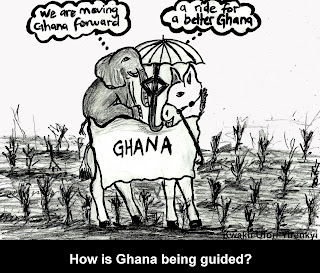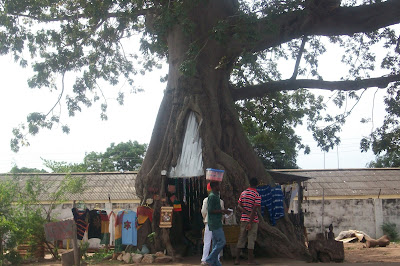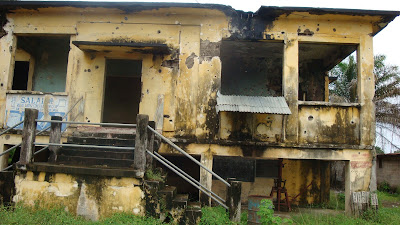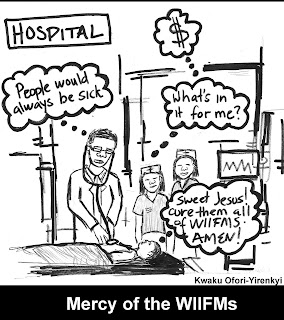Magical things happen the moment you become human. You breath, you cry, you laugh, you love, you sweat, and you remain in motion. But while in motion, it’s important to periodically pause to smell the roses in the midst of experiencing the thorns of life, the heart-warming loving, the rib-cracking laughter, and the heart-breaking crying.
Life is too short. Don’t just sit around waiting for someone – anyone, especially when you know in your heart and out of experience that the person might not show up. In the same vein, because life is too short, don’t just sit around doing nothing – nothing, just laying about with all hope lost. Get up and do something – anything, so that life does not pass you by. Life, this life, is not a dress rehearsal. This is it!
Ask yourself, ‘What can make you run in the rain when thunder is booming and lightning is threatening?’ If you figure it out, just do that thing. Also, ask yourself another enduring question: ‘What makes you come alive?’ If you figure it out, just do that thing. Ghana needs people who have come alive. Whatever makes you so restless and passionate to get up and run through the rain are the things you can dare yourself to do which in your normal comfort zone, you’ll never attempt.
The driver s of life are those things that make you come alive, that fires up passion so great within you that you’re ready to do things considered a little stupid. When that thing fires you up, all you do is to get up to move and to act. It is when you’re fired up that you’re able to reach beyond yourself with a determination to dare yourself, to succeed, and to live. This principle applies to careers, education, and believing in something or someone. Life’s journey unfolds when you invest into life with energy, attention and passion.
This passing year 2010, you might have heard of people who died suddenly for unexplainable reasons and you’ve wondered – eh, why! Two days before Christmas, a five year-old boy died in his sleep after a short illness. My heart broke. You might have seen in the newspaper obituary pages deaths of people of varied ages – the young and the old. Death is no respecter of persons, and of ages. When the death bell tolls, it welcomes all. Life can get shorter than we think.
I hold this strong belief that the cemetery is filled with graves of people who did not live out their lives to the fullest. As plans were being made, as disappointments were being endured, as dreams were being suspended, as loves were being rejected, as hearts were being broken – the death bell tolled and snatched the unsuspecting. That is just the way of life – not a dress rehearsal.
This passing year, you might have made plans and nurtured good intentions which fell in thorns by the stony roadsides of life. As a result, your year did not unfold as you envisioned. You did not unravel. The year 2010 passed you by and now that it’s over, you might be wondering – ‘Where did my life go?’ So would you dare to run barefooted in the rain in 2011 in a grand cross-over effort to dare yourself to do more?
Some of us simply live on the veranda of life. These are the balcony people – easily forgotten by those at the high table in the main hall. The balcony people, those in the porches and backyards, are easily exposed to the vagaries of the weather – rain, wind and the hot tropical sunshine. Many a time, the journey from the veranda to the living room can be so tough. The escape route from the veranda to a better place might be to simply jump into the hard-hitting tropical rain, barefooted and run, hoping against hope.
Life can be likened to the familiar comfort of sitting in an old couch with the springs collapsing and the stuffing sticking out. For some of us, although that old couch gets us nowhere, yet, we remain stuck to its old comfort. But there comes a time when we must throw away the old couch and dare ourselves to try other things with a firm conviction that life is short.
Life can also be likened to an old pillow. Some pillows are so tired and stinky, harbouring the germs, the dirt and the drooling of the ages. Although familiar, they must be thrown away because of over-usage that has rendered it unhealthy, flat and hardened with the stuffiness long gone.
The old couch and old pillow hold both good and bad memories. There is safety in the familiar, yet a fully lived life must go beyond the old couch and the old pillow. For some of us, including me, abandoning old pillows and old couches might be the only way to have a jump-start on life and by that, launch successful reversals to old familiar habits and appearances of quitting on life, quitting on love, quitting on hope, and quitting on dreams.
Yes, running barefooted in the rain exposes you to the vagaries of the elements, unprotected and leaving you next to nature. You might step on a nail and the tropical rainfall would beat you mercilessly, while the thunder and lightning threaten. But at the end of it all, you can shrug off the rain water, dry yourself up, and move on to newer and probably, better things. Then, someday, because you dared to confront life, you would celebrate the rain.
The lyrics of one songster, Aaron Tippin, goes: ‘Let's love like there's no tomorrow. Live for every moment. Laugh at least a little every day. It’s impossible to say if we’ll see the sunrise in the morning.’ How so true these precepts! These lyrics present three powerful principles to live by. They are: love, laughter and living in the moment.
Living in the moment, in the now, is so difficult because some of us spend excessive amount of time dwelling on yesterday’s pains and hurts and disappointments while the present moment with its possibilities passes by, never to return. We forget that what we always have for sure is now. We’re not guaranteed the next moment, the next day, the next week, the next month, the next year, the next decade.
When you love someone, enjoy the heart journey. We’re not guaranteed life to see the sunrise or the rainfall the day after today. And laughter makes life easier because if you don’t laugh, you would cry about the downs of life. Despite the storms of life, a healthy sense of humour brightens the dark corners.
My dear reader, I wish you a very happy and prosperous New Year. As for me, myself and I, we might set out to learn to dance ‘agbadza’ in 2011! Watch out! I might break-out dancing perfect ‘agbadza’ at a location near you sometime on the journey of 2011. On your part, find something challenging, fun and extraordinary to do in 2011 – something that is definitely outside your comfort zone – because whatever makes you come alive is what will drive you to run in the rain, barefooted.
Life is too short. Don’t just sit around waiting for someone – anyone, especially when you know in your heart and out of experience that the person might not show up. In the same vein, because life is too short, don’t just sit around doing nothing – nothing, just laying about with all hope lost. Get up and do something – anything, so that life does not pass you by. Life, this life, is not a dress rehearsal. This is it!
Ask yourself, ‘What can make you run in the rain when thunder is booming and lightning is threatening?’ If you figure it out, just do that thing. Also, ask yourself another enduring question: ‘What makes you come alive?’ If you figure it out, just do that thing. Ghana needs people who have come alive. Whatever makes you so restless and passionate to get up and run through the rain are the things you can dare yourself to do which in your normal comfort zone, you’ll never attempt.
The driver s of life are those things that make you come alive, that fires up passion so great within you that you’re ready to do things considered a little stupid. When that thing fires you up, all you do is to get up to move and to act. It is when you’re fired up that you’re able to reach beyond yourself with a determination to dare yourself, to succeed, and to live. This principle applies to careers, education, and believing in something or someone. Life’s journey unfolds when you invest into life with energy, attention and passion.
This passing year 2010, you might have heard of people who died suddenly for unexplainable reasons and you’ve wondered – eh, why! Two days before Christmas, a five year-old boy died in his sleep after a short illness. My heart broke. You might have seen in the newspaper obituary pages deaths of people of varied ages – the young and the old. Death is no respecter of persons, and of ages. When the death bell tolls, it welcomes all. Life can get shorter than we think.
I hold this strong belief that the cemetery is filled with graves of people who did not live out their lives to the fullest. As plans were being made, as disappointments were being endured, as dreams were being suspended, as loves were being rejected, as hearts were being broken – the death bell tolled and snatched the unsuspecting. That is just the way of life – not a dress rehearsal.
This passing year, you might have made plans and nurtured good intentions which fell in thorns by the stony roadsides of life. As a result, your year did not unfold as you envisioned. You did not unravel. The year 2010 passed you by and now that it’s over, you might be wondering – ‘Where did my life go?’ So would you dare to run barefooted in the rain in 2011 in a grand cross-over effort to dare yourself to do more?
Some of us simply live on the veranda of life. These are the balcony people – easily forgotten by those at the high table in the main hall. The balcony people, those in the porches and backyards, are easily exposed to the vagaries of the weather – rain, wind and the hot tropical sunshine. Many a time, the journey from the veranda to the living room can be so tough. The escape route from the veranda to a better place might be to simply jump into the hard-hitting tropical rain, barefooted and run, hoping against hope.
Life can be likened to the familiar comfort of sitting in an old couch with the springs collapsing and the stuffing sticking out. For some of us, although that old couch gets us nowhere, yet, we remain stuck to its old comfort. But there comes a time when we must throw away the old couch and dare ourselves to try other things with a firm conviction that life is short.
Life can also be likened to an old pillow. Some pillows are so tired and stinky, harbouring the germs, the dirt and the drooling of the ages. Although familiar, they must be thrown away because of over-usage that has rendered it unhealthy, flat and hardened with the stuffiness long gone.
The old couch and old pillow hold both good and bad memories. There is safety in the familiar, yet a fully lived life must go beyond the old couch and the old pillow. For some of us, including me, abandoning old pillows and old couches might be the only way to have a jump-start on life and by that, launch successful reversals to old familiar habits and appearances of quitting on life, quitting on love, quitting on hope, and quitting on dreams.
Yes, running barefooted in the rain exposes you to the vagaries of the elements, unprotected and leaving you next to nature. You might step on a nail and the tropical rainfall would beat you mercilessly, while the thunder and lightning threaten. But at the end of it all, you can shrug off the rain water, dry yourself up, and move on to newer and probably, better things. Then, someday, because you dared to confront life, you would celebrate the rain.
The lyrics of one songster, Aaron Tippin, goes: ‘Let's love like there's no tomorrow. Live for every moment. Laugh at least a little every day. It’s impossible to say if we’ll see the sunrise in the morning.’ How so true these precepts! These lyrics present three powerful principles to live by. They are: love, laughter and living in the moment.
Living in the moment, in the now, is so difficult because some of us spend excessive amount of time dwelling on yesterday’s pains and hurts and disappointments while the present moment with its possibilities passes by, never to return. We forget that what we always have for sure is now. We’re not guaranteed the next moment, the next day, the next week, the next month, the next year, the next decade.
When you love someone, enjoy the heart journey. We’re not guaranteed life to see the sunrise or the rainfall the day after today. And laughter makes life easier because if you don’t laugh, you would cry about the downs of life. Despite the storms of life, a healthy sense of humour brightens the dark corners.
My dear reader, I wish you a very happy and prosperous New Year. As for me, myself and I, we might set out to learn to dance ‘agbadza’ in 2011! Watch out! I might break-out dancing perfect ‘agbadza’ at a location near you sometime on the journey of 2011. On your part, find something challenging, fun and extraordinary to do in 2011 – something that is definitely outside your comfort zone – because whatever makes you come alive is what will drive you to run in the rain, barefooted.




